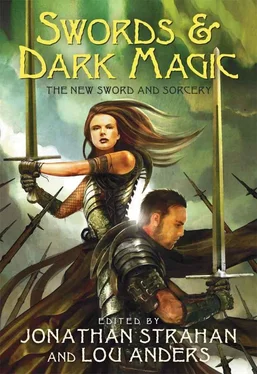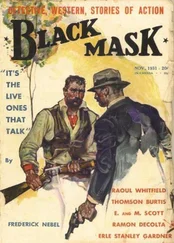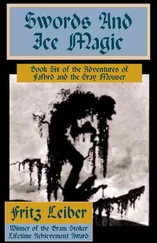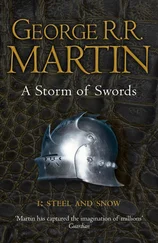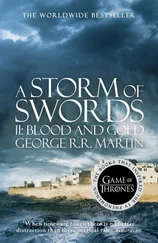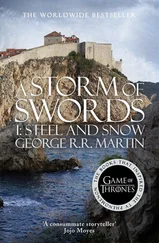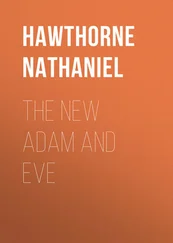Sword and sorcery wouldn’t officially be labeled as its own subgenre until 1961, however, when Michael Moorcock published a letter in the fanzine Amra , demanding that the type of swashbuckling adventure story pioneered by Howard be given a name. Ironically, Moorcock originally proposed the term “epic fantasy,” a label that has since come to be applied to the other side of the coin, that of J. R. R. Tolkien and his successors. But Fritz Leiber christened the subgenre when he wrote in the July 1961 issue of Amra , “I feel more certain than ever that this field should be called the sword-and-sorcery story. This accurately describes the points of culture-level and supernatural element and also immediately distinguishes it from the cloak-and-sword (historical adventure) story—and (quite incidentally) from the cloak-and-dagger (international espionage) story too!”
In this same year, Moorcock would pen The Dreaming City , the first tale of his antihero Elric of Melniboné, arguably the only sword and sorcery protagonist to reach Howard’s level of influence. Conceived as an anti-Conan—or, rather, Conan as an angst-ridden teenager—Elric was a sickly, drug-taking albino who relied upon an evil, soul-sucking black sword to feed him the stolen energies to both maintain his life and increase his vitality. Simply put, Moorcock’s contribution to fantasy literature cannot be overstated. The New Wave movement that he later pioneered forever changed the face of science fiction, just as his concept of the “multiverse” would as well, even spilling out of the pages of imaginary tales to grace the lips of our contemporary physicists, but for our purposes here, it might be his alteration of the battle of Good versus Evil into that of Law versus Chaos (with disastrous consequences implied if either side ultimately triumphed over the other) that made the most significant contribution to fantasy literature. His heroes, whether Elric of Melniboné, or Dorian Hawkmoon, or the rock and roll assassin Jerry Cornelius, were all manifestations of the Eternal Champion, a soul doomed to forever maintain the “Cosmic Balance” by lending weight to one side of the scales or the other. Moorcock’s influence is colossal, his shadow cast everywhere from role-playing games (and thus, subsequently, all third-person computer and console gaming) to rock and roll to literature. The alignment wheel of Dungeons & Dragons is nothing short of his Law vs. Chaos and Good vs. Evil plotted on an X-Y axis, and it is no surprise that Michael Chabon’s foray into fantastical swashbuckling, Gentleman of the Road , is dedicated to the fantasy grand master. But it is Moorcock’s character of Elric the Albino that came to define the sword and sorcery subgenre as much as Howard’s creation.
Also of note is Andre Norton, whose long-running Witch World stories, beginning with Witch World in 1963 and continuing up through this century, were both seminal sword and sorcery works (albeit rather heavy on the sorcery), as well as seminal romantic fantasy works.
During the 1960s, 1970s, and 1980s, led by Lin Carter, the Swordsmen and Sorcerers’ Guild of America promoted the interests of the subgenre. From 1973 to 1981, SAGA produced five anthologies, edited by Carter and featuring the contributions of their members, under the series title Flashing Swords! The year 1974 saw the debut of Charles R. Saunders’s Imaro tales, which appeared first in the fanzine Dark Fantasy but, by way of Lin Carter’s Year’s Best Fantasy Stories (DAW Books, 1975), eventually found their way to publisher Donald A. Wolheim, who urged Saunders to publish them as a novel in 1981. Imaro was followed by The Quest for Cush (1984) and The Trail of Bohu (1985). [§] Imaro and The Quest for Cush are both currently available from Night Shade Books. The Trail of Bohu has recently been self-published by the author.
The stories are notable for being the first sword and sorcery penned by a black author and starring a black protagonist. The title character, Imaro, inhabited the “black continent” of Nyumbani, an “alternate Africa” that existed thousands of years ago, perhaps contemporaneously with Robert E. Howard’s Hyperborea.
Then, in 1984, Marion Zimmer Bradley made a significant contribution to the field with her Sword and Sorceress anthology series. Feeling that, C. L. Moore excepted, the subgenre was dominated by men and typified by some fairly reprehensible attitudes toward and depictions of women, she produced twenty volumes (two published posthumously) of adventure tales featuring strong female protagonists and promoting such notable authors as Bradley herself, Glen Cook, Emma Bull, Charles R. Saunders, Charles de Lint, Pat Murphy, C. J. Cherryh, Jennifer Roberson, Mercedes Lackey, and many more. After Bradley’s death in 1999, the anthology series continued in a new volume edited by Diana L. Paxson ( Sword and Sorceress XXI , DAW, 2004) and, recently, in two volumes from editor Elisabeth Waters (Norilana Books, 2007).
But, generally speaking, the last few decades was a time when sword and sorcery fiction was once again out of favor. The 1982 film Conan the Barbarian , which made Arnold Schwarzenegger a household name, spawned a sea of poorly executed sequels and imitations that had the effect of stigmatizing the subgenre’s image. Though its practitioners never entirely went away, the fantasy genre came to be dominated by the post-Tolkien variety of epic fantasy. At the short form, sword and sorcery fiction fell out of favor with the larger magazine venues, and the type of adventure fantasy that Robert E. Howard once epitomized was relegated to the domain of the small press (most notably, Black Gate magazine, which has been the definitive source for sword and sorcery short-form works since its launch in 2000). But recently, sword and sorcery has been making a comeback. In the wake of George R. R. Martin, whose Song of Ice and Fire series is notable for bringing a moral ambiguity and gritty realism to the fantasy epic, a host of younger writers have emerged to bring a “sword and sorcery sensibility” back to the epic subgenre. Writers like Steven Erikson, Joe Abercrombie, Scott Lynch, Tom Lloyd, David Anthony Durham, Brian Ruckley, James Enge, Brent Weeks, and Patrick Rothfuss are pioneering a new kind of fantasy, one that blends epic struggles with a gritty realism, where good and evil mixes into realistic characters fraught with moral ambiguities, and struggles between nations are not so one-sided as they are colored by a new, politically savvy understanding. These hard-hitting tales are reinvigorating the fantasy genre, while at the same time its classic forebears are finding new readers. For the first time in many years, Robert E. Howard’s and Michael Moorcock’s original stories are available again, in new, lavishly illustrated editions that restore their original texts, complete with copious historical notes. Leiber’s full saga of Fafhrd and the Gray Mouser is back on shelves, just as C. L. Moore’s oeuvre is out in a complete collection. The MMORG Age of Conan is a huge success, and both Conan and Elric movies are currently in development. While Howard, sadly, left us in 1936, Moorcock has recently been writing new tales of the Melnibonéan, one of which appears in this volume. With all the excitement surrounding this new cadre of writers, combined with the recent celebration of their historic roots, there is no better time for a definitive look at the new fantasy. Here, then, are seventeen original tales of sword and sorcery, penned by masters old and new. What follows are stories of small stakes but high action, grim humor mixed with gritty violence, dry fatalism in the face of strange magics, fierce monsters and fabulous treasures, and, as ever, lots and lots of swordplay. Enjoy!
Читать дальше
